From Major League Dreams to Life's Final Innings at Rainbow: A Baseball Legacy
From Major League Dreams to Life's Final Innings at Rainbow: A Baseball Legacy
by Kenyon Kemnitz
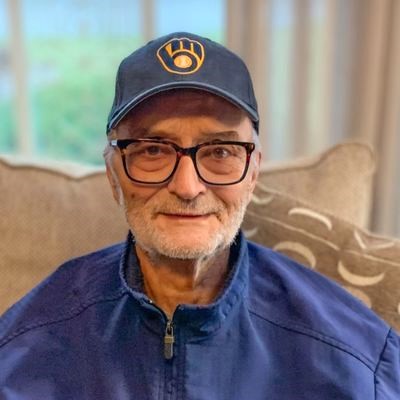
Chuck and Fran Frandson can’t watch a baseball game on television without thinking about him. They often wonder what he would be saying and whether certain performances by Major League pitchers would be up to his standards. They know he would be quick to offer suggestions on how a pitcher could escape a bases-loaded jam.
“Because he was a pitcher, he’d analyze the pitchers more than anything and pinpoint the hitters’ weak spots,” said Chuck. “He’d say, “If they throw (Christian) Yelich down and in, he can’t hit that low slider.”
Lou Yanz grew up hearing about how great his Uncle Nick was with a baseball. Lou was born in Fort Atkinson but moved with his mother to Gary, Indiana, when he was five years old. At that time, his Uncle Nick Strincevich was already a few years into his Major League baseball career as a pitcher.
Strincevich, nicknamed ‘Jumbo,’ broke into the big leagues with the Boston Bees in 1940, which soon rebranded as the Braves. His MLB career spanned ten years and also included stints with the Pittsburgh Pirates and Philadelphia Phillies. Most of Strincevich’s 1941 and 1942 seasons were spent serving his country during World War II. Afterward, he became one of the National League’s best pitchers, battling some of the game’s greatest hitters like Stan Musial, Jackie Robinson, Johnny Mize, and Frank McCormick. Strincevich pitched his way to 14 wins in 1944 and followed that up with 16 more the next season.
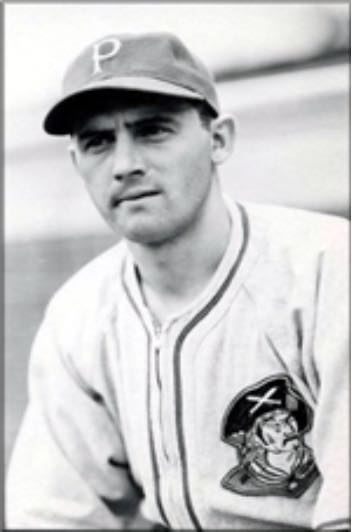
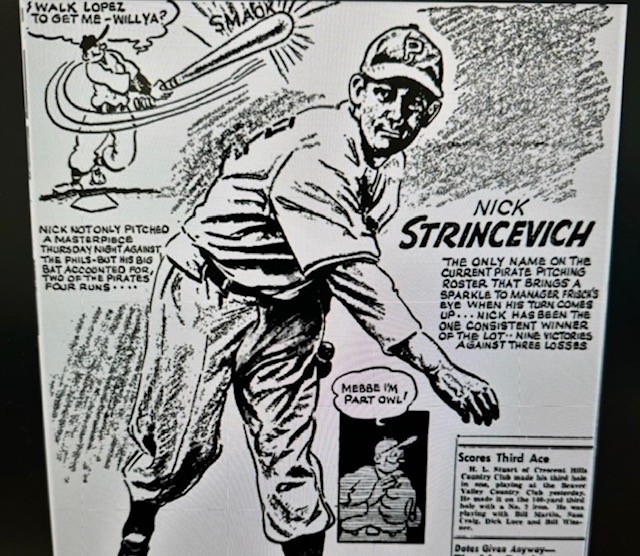
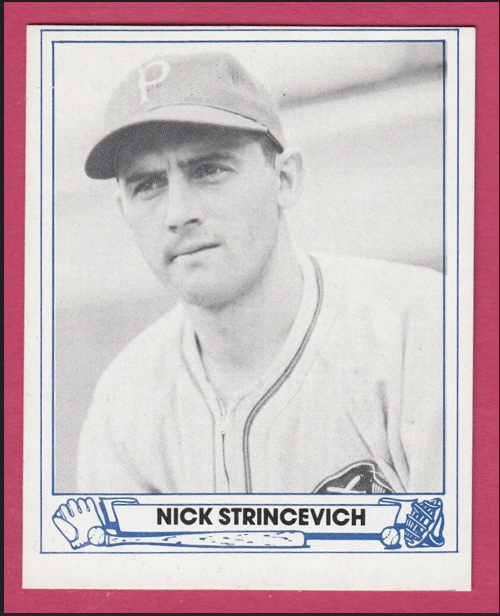
“Lou and my mom were living with my grandma at the time, and she listened to all Uncle Nick’s games and wrote down all his stats,” said Fran. “She was so excited about it, and I think that really sparked Lou’s love for baseball.”
Surprisingly, Lou didn’t play any organized sports until he moved back to Fort Atkinson for his senior year of high school.
Lou felt right at home on the baseball field, especially on the mound. He became a solid pitcher, just like his Uncle Nick. The southpaw could bring the heat and collected many strikeouts, including a memorable game his senior year where he pitched a 12-inning affair, and finished with 20 strikeouts, ultimately leading his team to a share of the Badger Conference title.
Lou relished his role as the team’s number one pitcher. Back then, there was no designated hitter in the lineup, so Lou took his spot in the batting order and ended up leading his team in hitting. He batted an impressive .563 average in his lone season for the Blackhawks. He then took his talents to the Fort Junior Legion team that summer and continued his stellar play, including smashing an inside-the-park home run near the end of the season.
Lou proved to be a natural athlete, excelling in baseball, basketball, and track. During the same spring season in which baseball was in full swing, Lou also joined the track team and became part of Fort’s 440-yard relay team, which set a conference record.
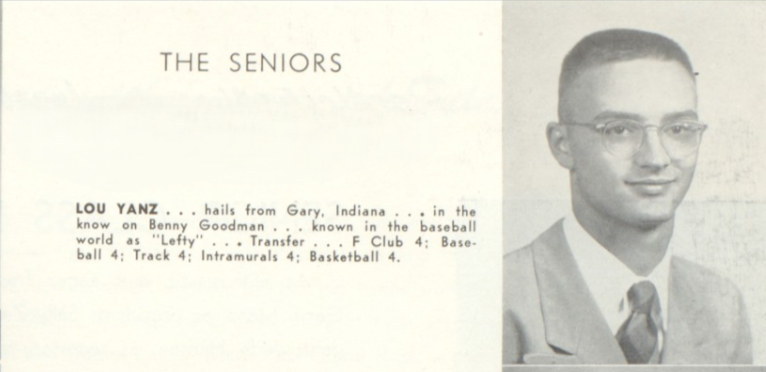
“Who goes to another town and has the nerve to say they want to try out for a sport?” Chuck said. “He even told me he wanted to play football when he came back, but his dad wouldn’t let him because he wanted him to focus on being a baseball player and didn’t want him to get banged up.”
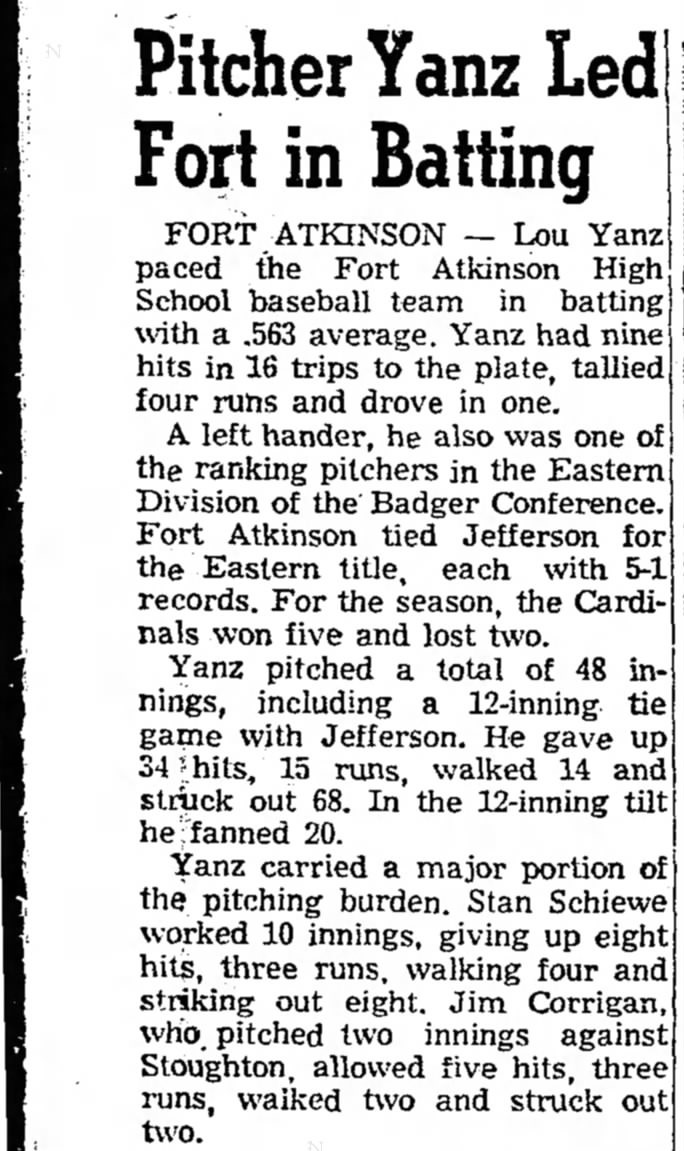
After graduating from Fort High School, Lou then pitched for Milton College, where his delivery and command only got better. During summer break, he played for the Milton Merchants, an Adult Amateur Baseball team, going 5-0 as a starter, as his team captured the first-half Southern Division Championship in 1957. Around that time, a scout for the Cincinnati Reds discovered Lou. He spent three games with the Reds minor league affiliate, the Bradford Beagles/Hornell Redlegs in the New York Pennsylvania League, before returning to Wisconsin.
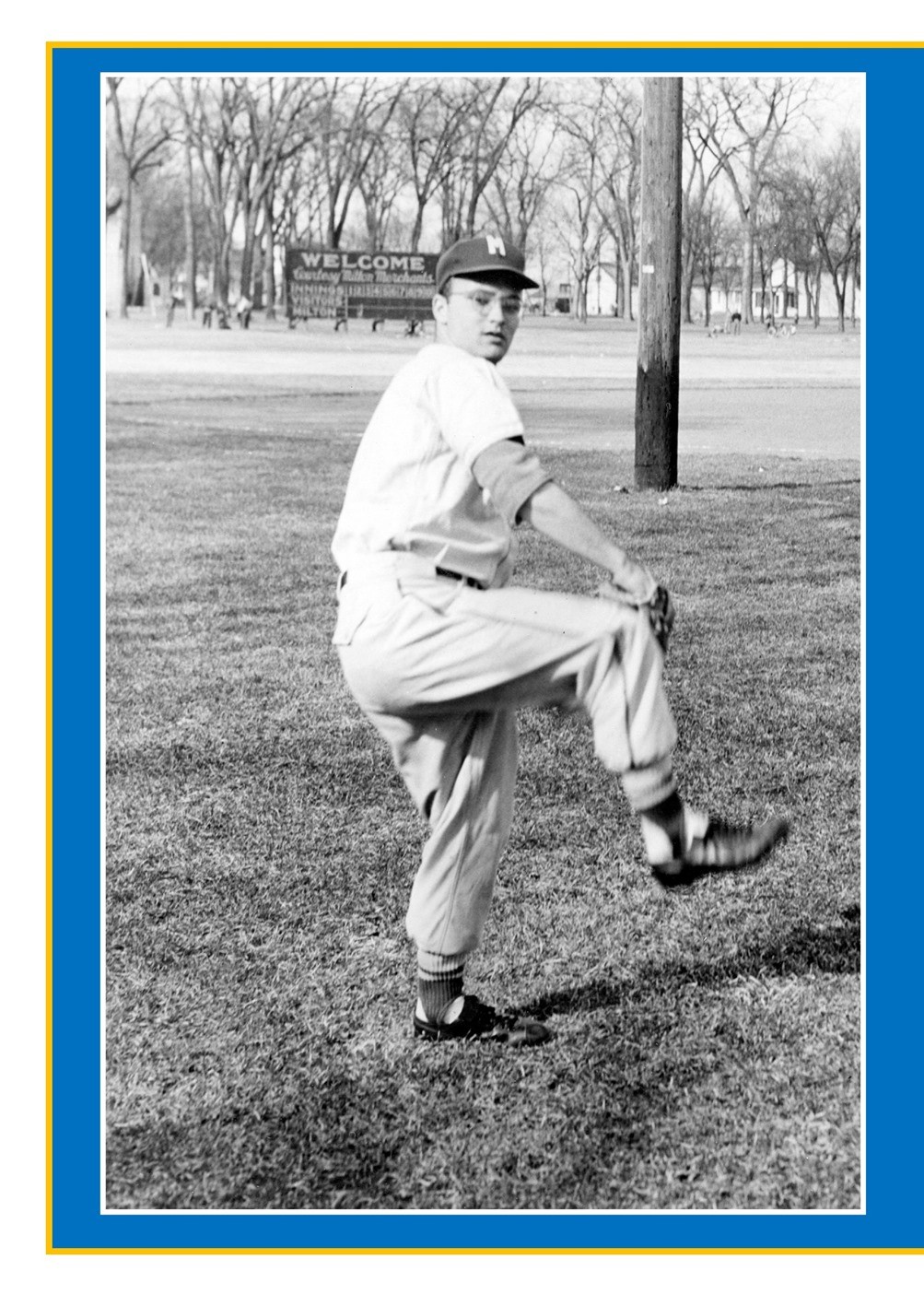
Lou pitched another season at Milton College, and the following summer led the Merchants to their first Central Wisconsin Baseball League Championship since 1948.
In 1960, Lou got another shot in the minors, pitching five years in the Carolina and New York-Pennsylvania Leagues with teams that were affiliated first with the Washington Senators before they relocated and became the Minnesota Twins.
“My family thought it was pretty cool,” Fran said. “But it wasn’t like we got to watch him on TV. Being so young, I didn’t realize the significance of him being a ball player.”
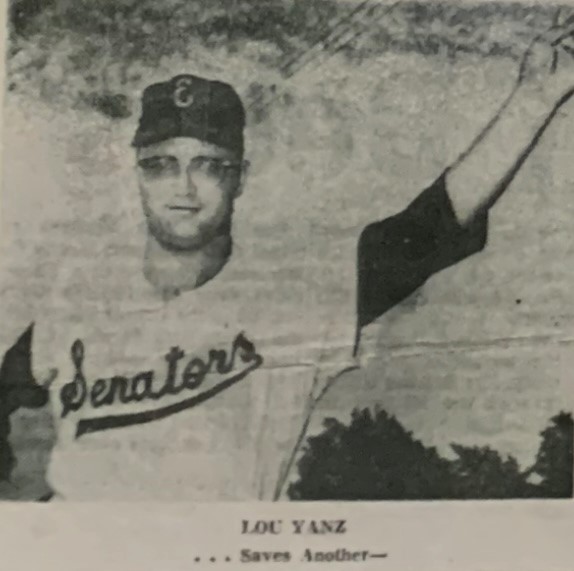
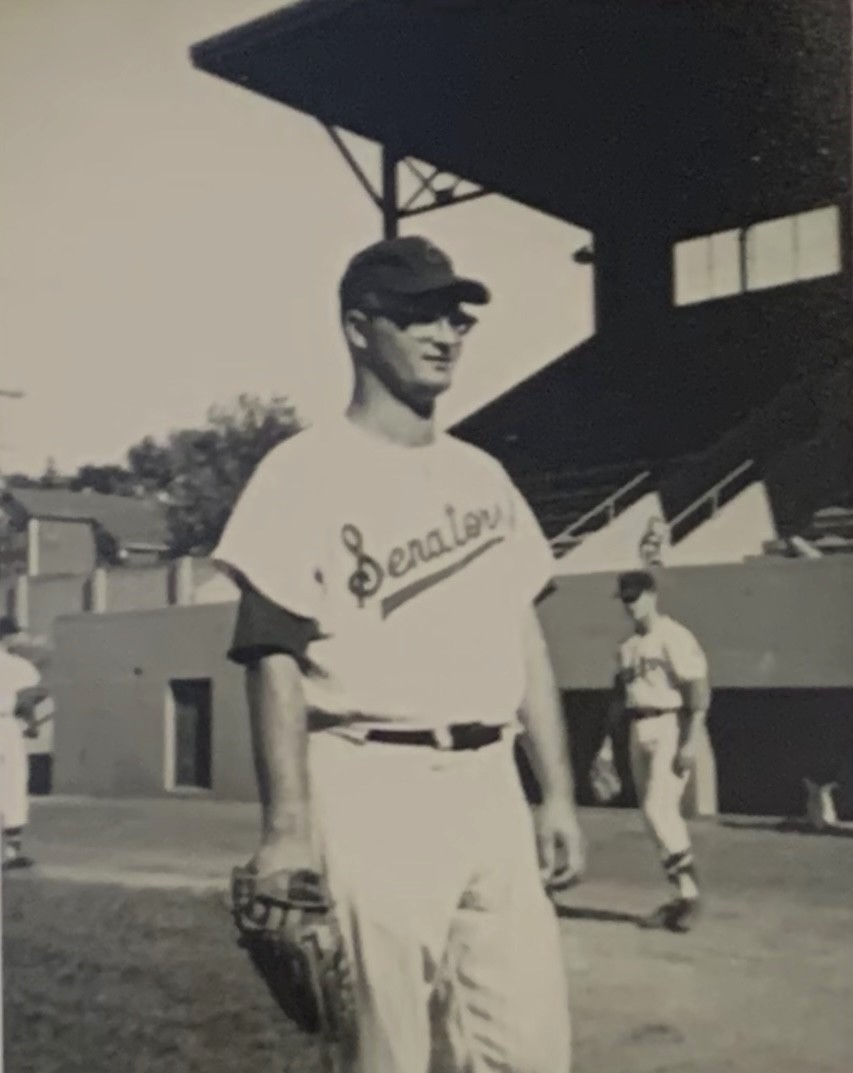
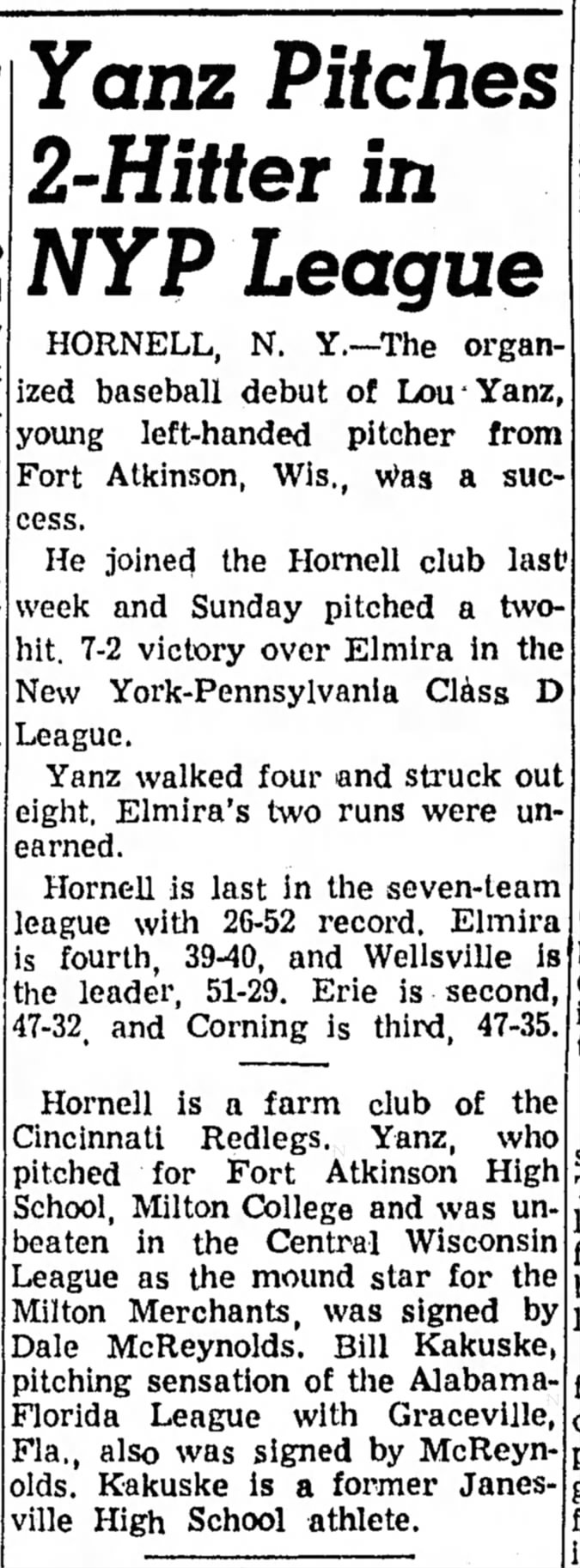
When he was playing baseball, Lou also served his country as a Marine reservist for seven years, starting at a training base in Parris Island, South Carolina.
Even though Lou never made it to “The Show,” he came closer than most players. He returned to Wisconsin and played with the Merchants for a few more seasons. Lou’s love for baseball served as a constant thread throughout his life, creating lasting connections and cherished memories.
In the late 1960s, Chuck met Lou when they played softball together on Fort Atkinson’s City League softball team. Spending time in the dugout as teammates turned into a special friendship, as Lou became a local legend on the softball field.
“He could pound the baseball,” Chuck said. “There was no question who the guy was that lit a fire under everybody else. He was truly the leader of that group and was fiercely competitive.”
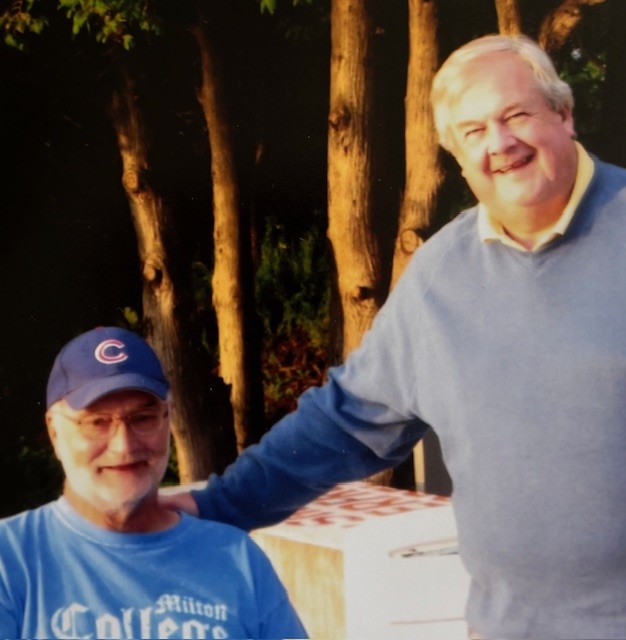
It was Lou who introduced Chuck to his future wife, who just happened to be Lou’s younger sister, Fran. They first met during Christmas of 1972 and will celebrate 52 years of marriage this November.
“We stopped by where Chuck was working at Jensen & Jones, (a former department store in Fort),” Fran recounted. “Lou started teasing me like he always did and said if Chuck liked me, he would meet us at Satan’s Cellar (a former bar in Fort) when he got off work. Lou kept looking at the clock and saying, ‘He’s not here yet. I don’t think he’s going to come. That’s too bad, but it’s okay, because if you married him, you’d be Fran Frandson. What kind of a name is that?’ He teased me for about 15 minutes before Chuck finally walked in. Lou was a character, but there were times I wanted to wring his neck.”
Lou’s family describes him as “one-of-a-kind.” He left an unforgettable impact on every team he played on, no matter what level.
Chuck remembers one time they went to watch a Brewers game at the old Milwaukee County Stadium. When they walked down by the Twins’ dugout, it turned into a reunion for Lou and some of his former minor league teammates.
“Guys like Rich Reese were like, ‘Hey, Fox,’ that’s what they called him,” Chuck stated. “It was pre-game, and you would think these guys should be getting ready to play a professional baseball game, but it was more like, ‘We’ll get to this later. Let’s go see our old buddy first.”
You could hardly ever find Lou without a baseball cap on, and he never stopped watching and studying the game.
“It didn’t matter what time of day we stopped by his house, he’d be watching a baseball game,” Chuck said. “He didn’t just watch the game like most people do for the final score or how many hits there were. He watched what the pitcher was throwing. His vision into the game was much deeper than the average person.”
Lou played softball into his 40s and without any children of his own, loved spending time with Chuck, Fran, and his only niece, Sarah Dorfman. He would occasionally drop by Chuck and Fran’s house without any warning.
“When the doorbell rang, we thought, ‘That’s probably going to be Lou,’ Chuck laughed. “He would count to five and then we’d race to the door, only to find him getting in his car. It’s like, ‘Lou, you’ve got to give us a chance to get up and get there!’ But the next day, it would be the same thing.”
Lou was admitted to the Rainbow Hospice Inpatient Center (IPC) in early October 2024. During his stay, several friends and former softball teammates stopped by to visit him. Often times, there would be a line of people outside his door.
“The nurses would say, ‘Here comes Lou’s entourage,’ Fran recalled.
When his family would visit, his great-nephew, Charlie, loved to hear Lou’s baseball stories and advice from someone who had been around the game for so long. Sarah’s three children, Thea, Harper, and Charlie, all adored their “Uncle Lulu.”
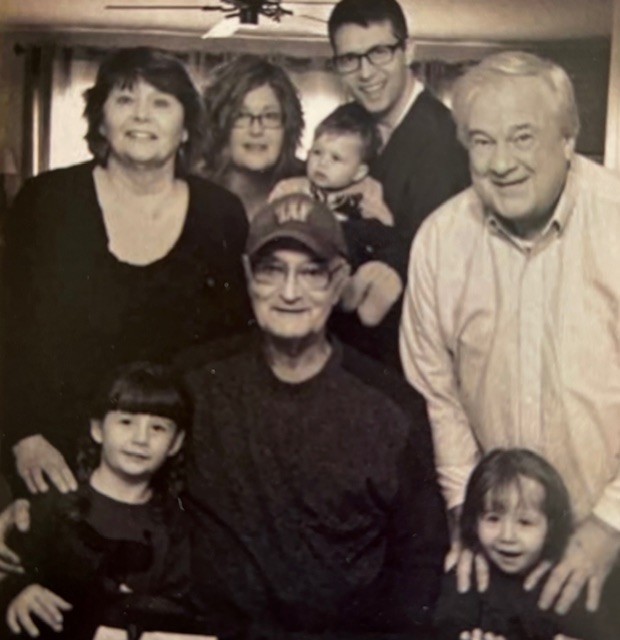
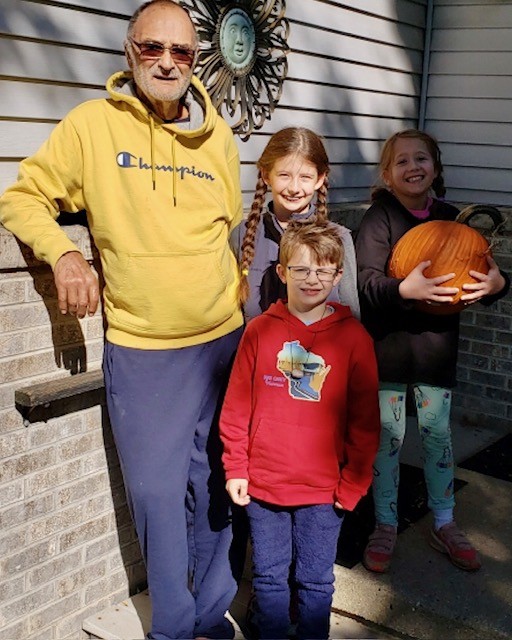
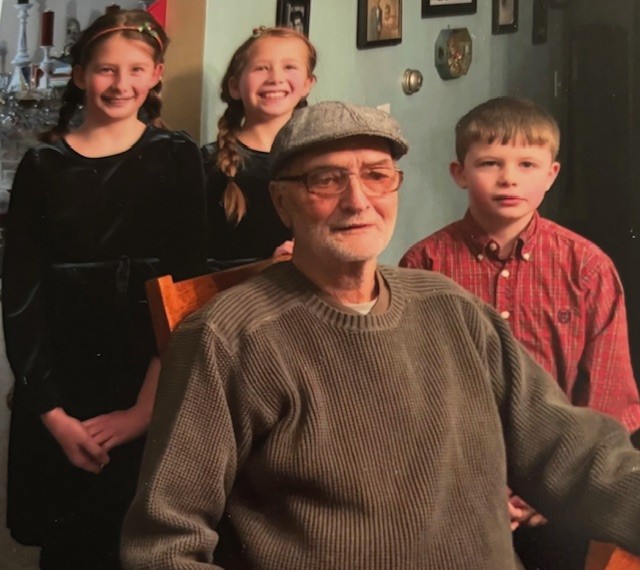
“It was so cute when Charlie would go right next to his chair,” Fran said. “Lou told him, ‘When you play baseball, you don’t chew that snuff. You only chew bubble gum.’ Charlie wears a baseball hat every day like Lou, and he’s figured out how to play hallway baseball at home. Lou left quite an impression on him.”
Lou had seen the Inpatient Center before, right after it opened in March 2011. Chuck was working as President of the Rainbow Hospice Foundation, and Fran volunteered for Rainbow when funds were being raised to construct the building. Lou made a generous donation to make that project possible, and the fireplace in its Community Room is named in his honor.
As Lou grew weaker, he remained grateful for the care provided by his nurses and IPC Chef Josh Rosburg, who often prepared his favorite meal: grilled cheese and a chocolate malt. He stayed engaged with baseball during his final days.
Lou watched game one of last year’s World Series and was still making comments and offering his analysis about the game with one of his nurses, Tessy Noel.
“Lou didn’t think he would be alive to watch the game,” said Noel. “Lou had been more fatigued, but stated he still wanted to watch it. I was able to make time to be with Lou during the game, and he knew the statistics of many of the players. It was enjoyable spending that time with him and reminiscing about his baseball days.”
Lou passed away peacefully the next day at age of 87.
Fran is 11 years younger than her brother, so she grew up without fully realizing his significance on the field. She never got to see him play in any games until he became a softball star in Fort.
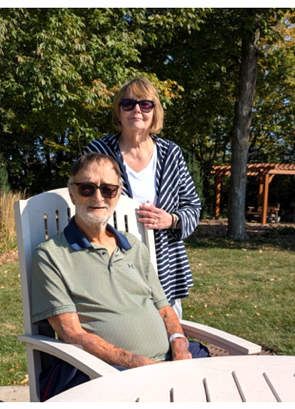
“It makes me sad that I was too young to appreciate what he accomplished,” Fran said. “He never bragged or talked about being good at everything. I think about him every day and what I would like to tell him. It is very different without him.”
Not long after Lou passed away, the Frandson family decided to honor him by dedicating a brick in Rainbow’s memorial garden. The brick symbolizes his legacy and the cherished memories of him they hold dear in their hearts.
They saw the brick for the first time during Rainbow’s annual Brick Dedication Ceremony on August 21.
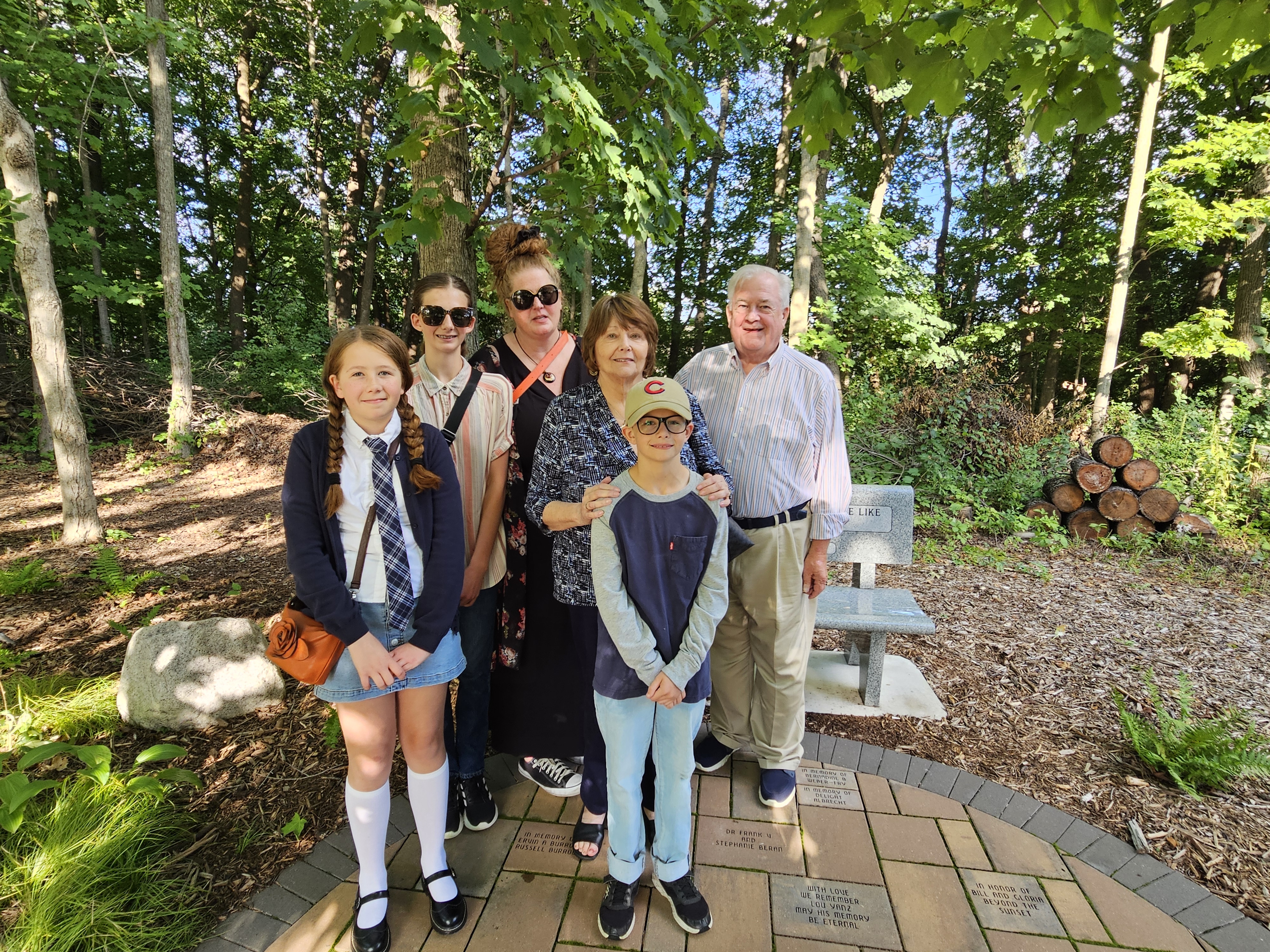
“It felt like closing the circle,” Chuck said. “He loved being outside in the garden during our visits with him. The kids would wander along the paths and then come back to spend more time with him. This is a perfect place to put that final memory in place.”
“It’s like there is a little bit of Lou out there now,” Fran said.
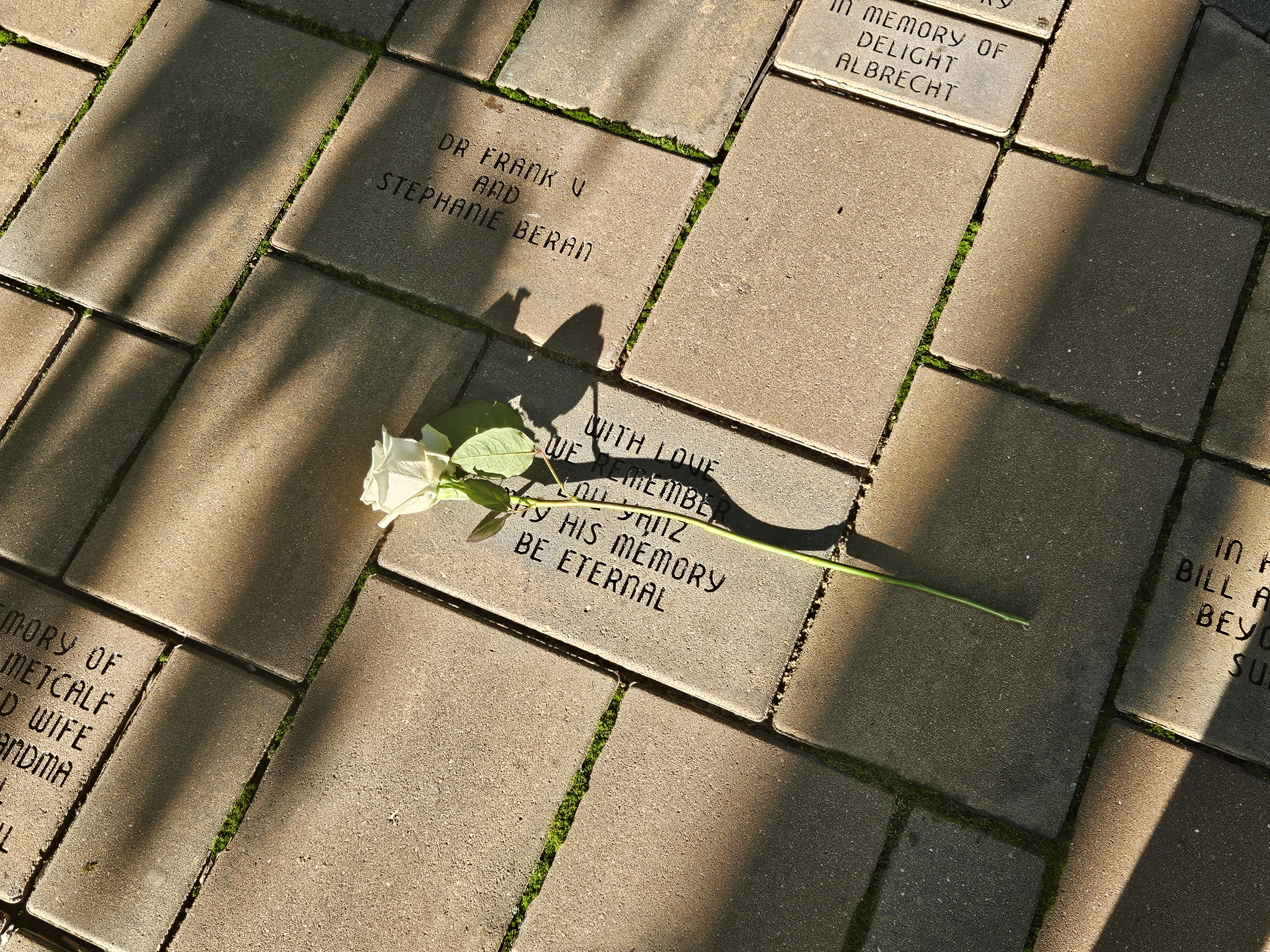
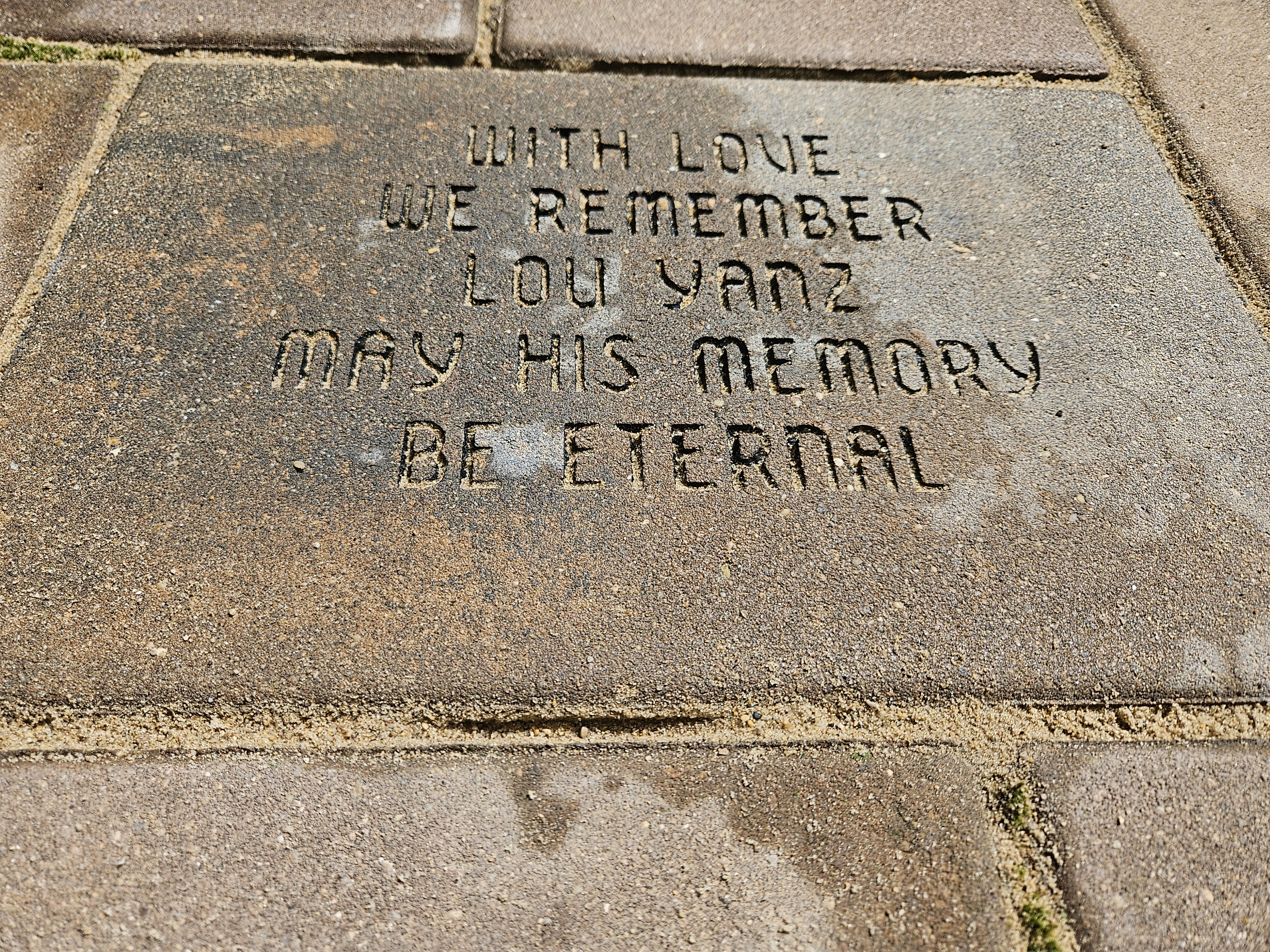
Lou Yanz may not have become a well-known name in professional baseball, but America's favorite pastime played a significant role in his journey as a minor league player, as well as shaping his family relationships and personal identity.
Now, Lou and Uncle Nick are likely together, enjoying a game of catch on their own Field of Dreams.